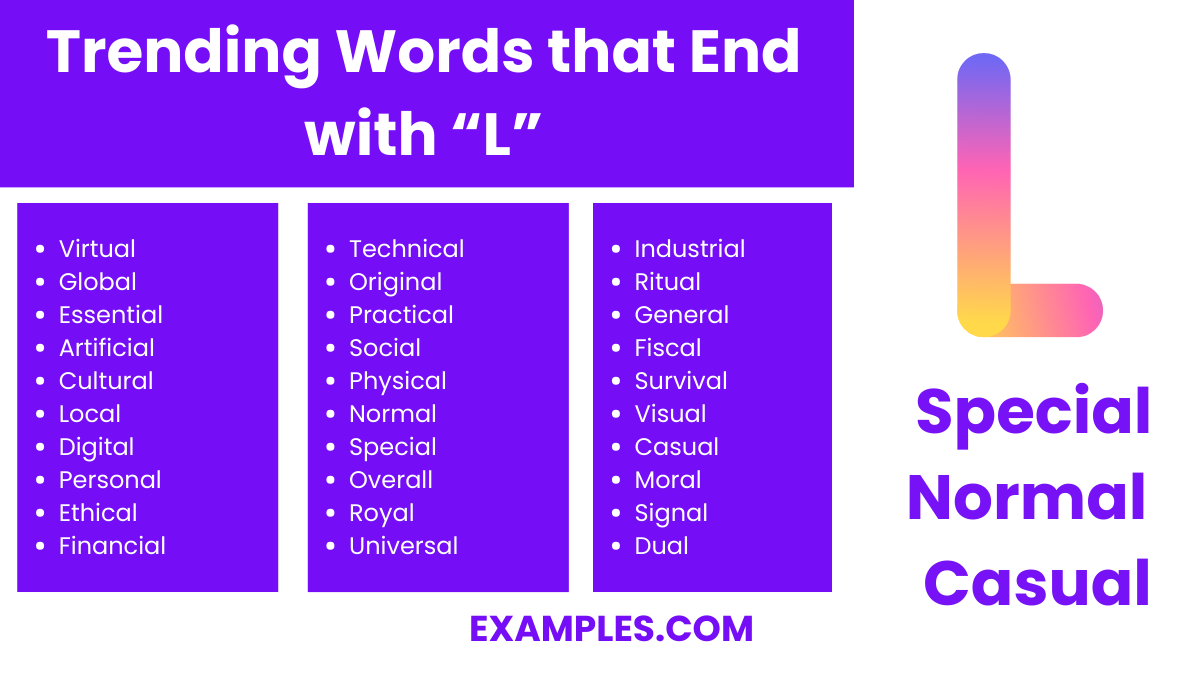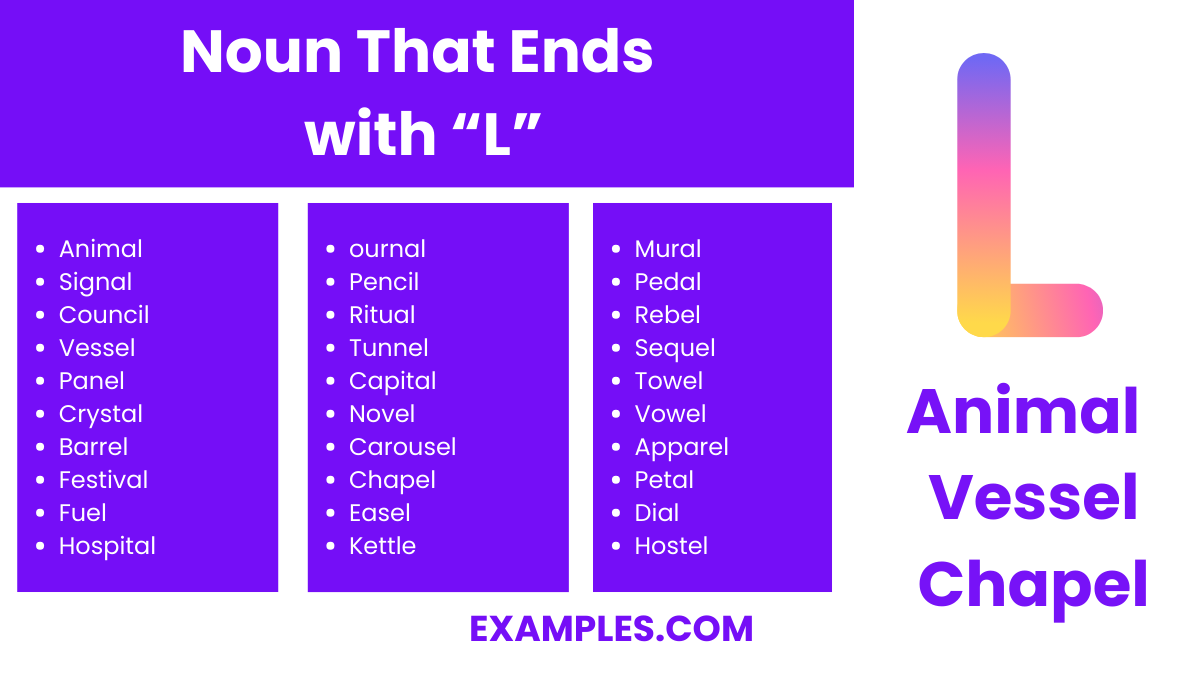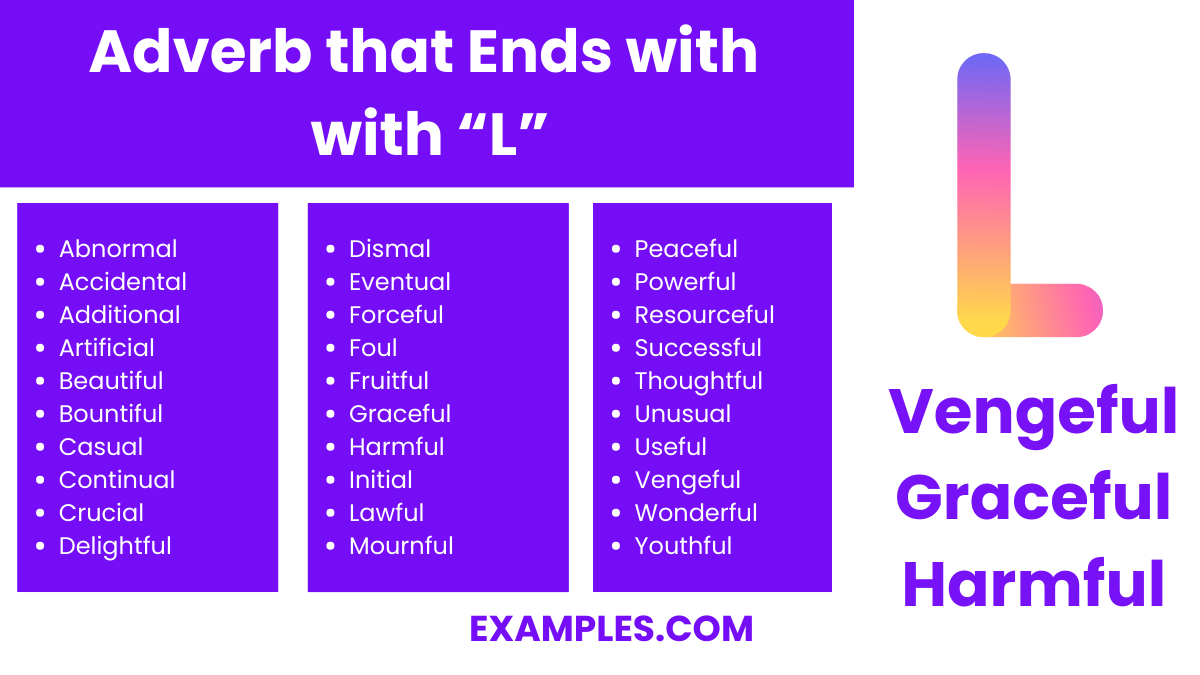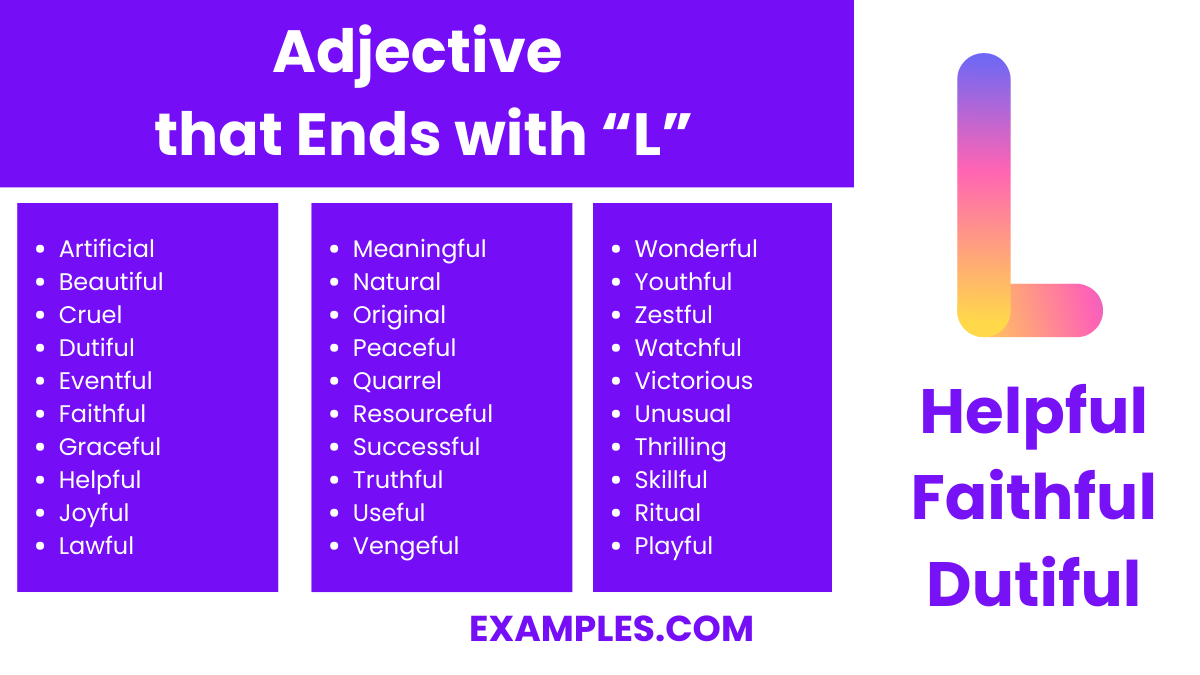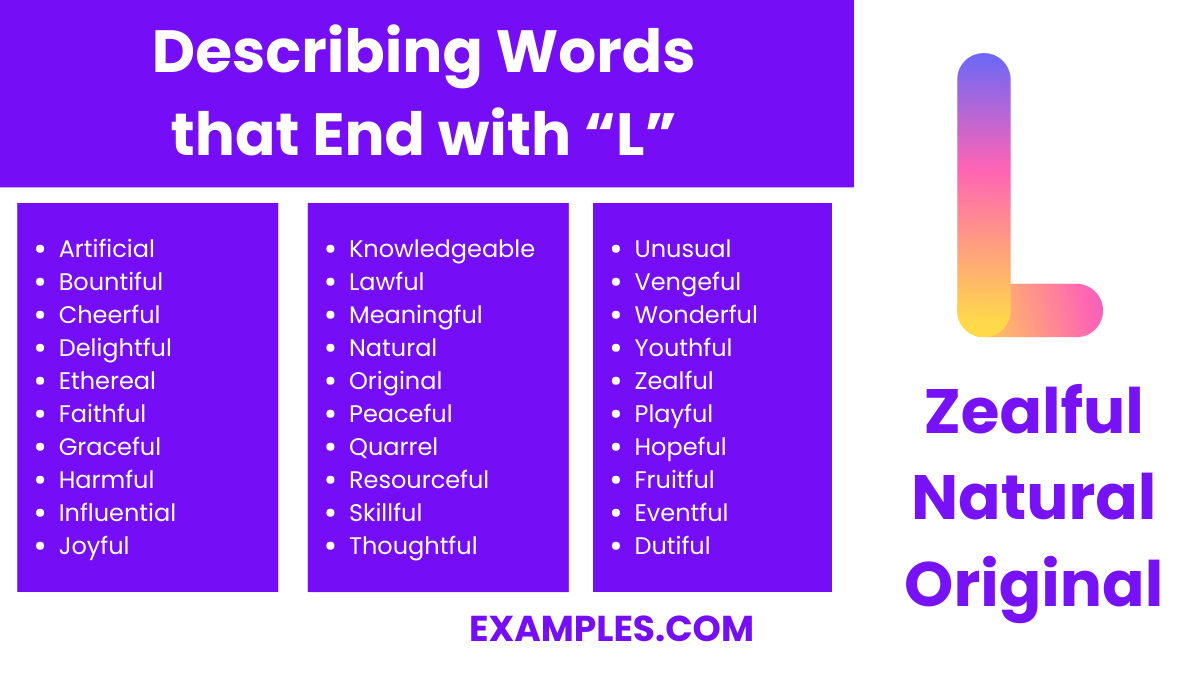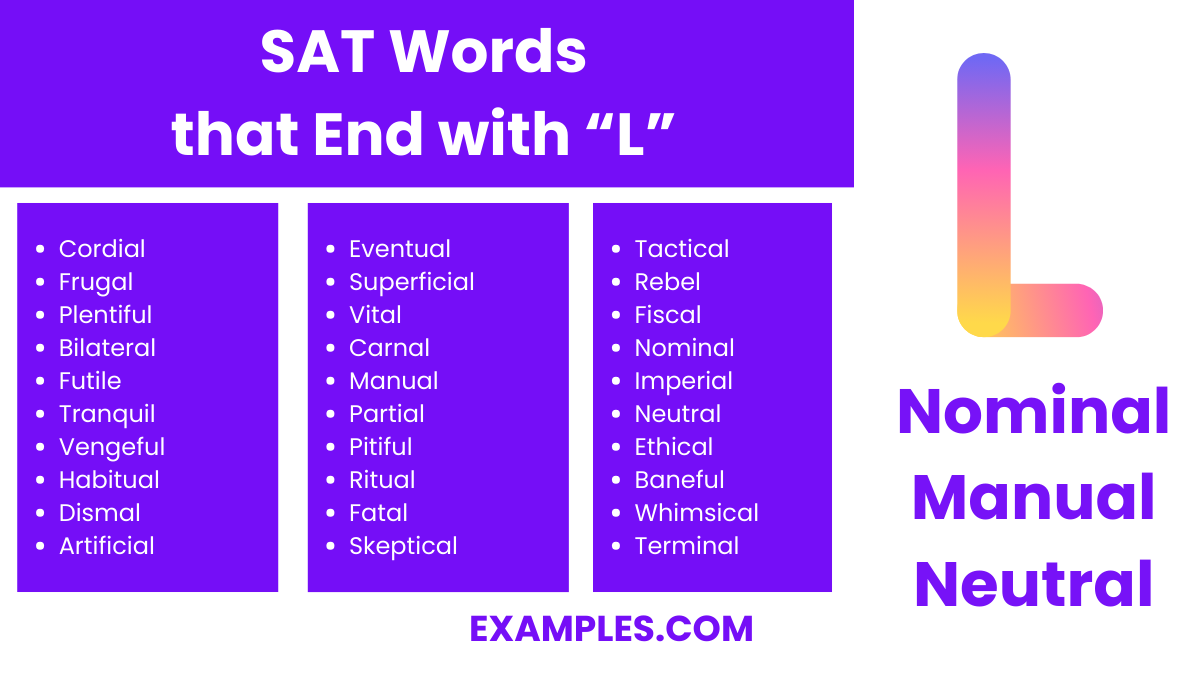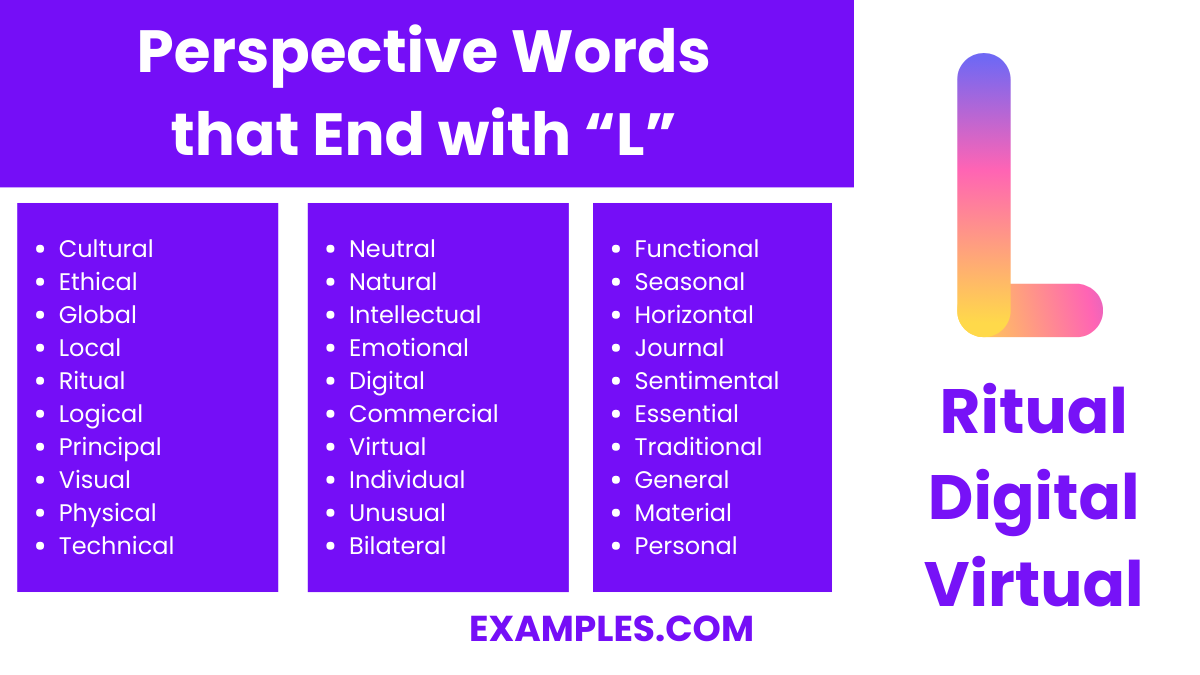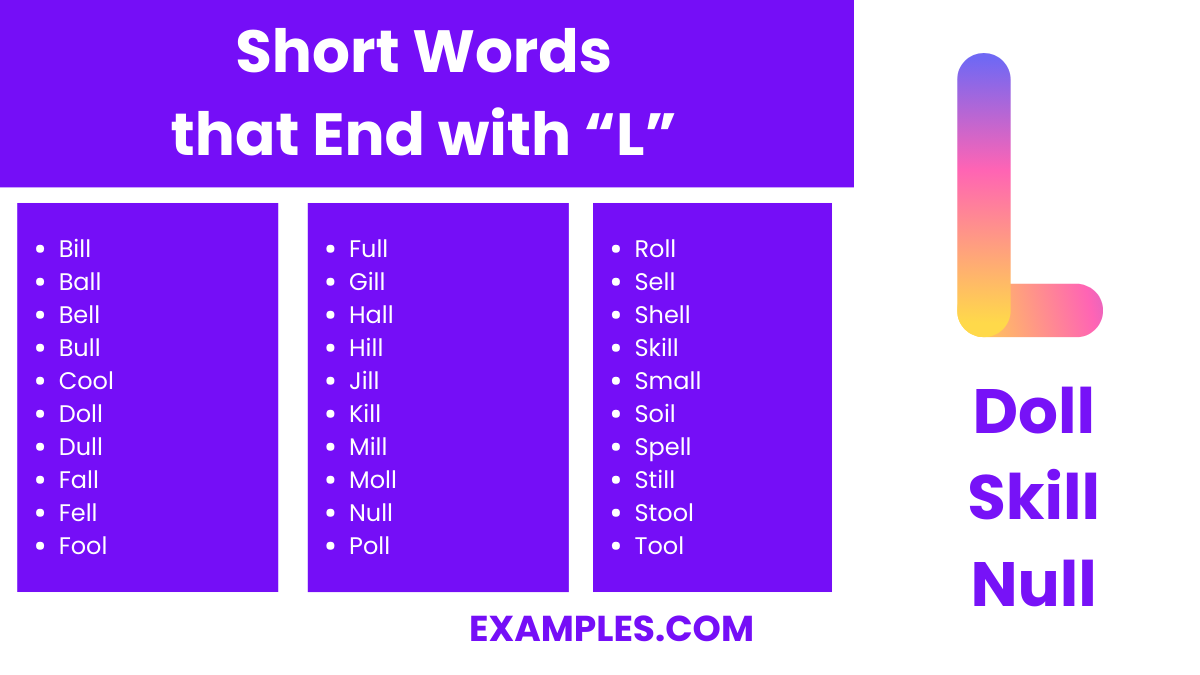Words Ending With L
The words that end with ‘L’ unveils a captivating aspect of the English language, showcasing its versatility and richness. These ‘L’ words ending, from the serenity of ‘tranquil’ to the foundational ‘essential’, play a pivotal role in crafting expressive and nuanced sentences. For educators and learners, exploring this category of words broadens vocabulary and deepens understanding of linguistic structures. Whether it’s the gentle ‘ripple’ of water or the steadfast ‘loyal’ in relationships, each word adds a unique layer to communication. Engaging with these words enhances descriptive capabilities, making language more vivid and impactful. This exploration not only aids in language mastery but also in appreciating the subtle beauty of English.
Download Most Commonly Used Words Ending with L - PDF
150 Most Commonly Used Words Ending with “L”
As educators, our mission is to empower students with a robust vocabulary. Enhancing their communication skills begins with understanding word structures, particularly those ending with the letter ‘L’. This comprehensive list of 150 words, meticulously arranged in a table format, serves as an invaluable resource. By integrating these words into daily lessons, we can significantly improve students’ linguistic abilities. The diversity of these words, ranging from simple to complex, caters to various learning levels, ensuring that every student benefits. Let’s dive into this linguistic journey, enriching our students’ vocabulary and bolstering their confidence in English communication.
| final | equal | total | special | normal | cruel |
| usual | global | local | royal | novel | legal |
| level | civil | vital | signal | formal | casual |
| rural | verbal | moral | social | central | fruitful |
| personal | physical | visual | original | ideal | natural |
| mutual | manual | loyal | capital | facial | crucial |
| minimal | digital | delightful | tribal | label | Ritual |
| parallel | tunnel | kernel | coral | jewel | council |
| rental | naval | angel | vessel | eternal | crystal |
| journal | plural | bowel | counsel | fuel | model |
| towel | channel | apparel | gospel | initial | general |
| travel | barrel | dorsal | arrival | faithful | interval |
| beautiful | gruel | decimal | dual | filial | frugal |
| aerial | annul | basal | bristly | brutal | bursal |
| clausal | coeval | colossal | distal | eventful | harmful |
| enamel | ensnarl | eternal | fatal | feudal | filial |
| powerful | flannel | floral | feral | frugal | gerbil |
| colorful | joyful | humeral | jostle | kennel | lethal |
| liminal | lineal | wonderful | thoughtful | marginal | medal |
| mental | morsel | mural | nasal | natal | neutral |
| nuptial | occipital | octal | ordinal | panel | pastoral |
| penal | peril | petal | pineal | portal | postal |
| prenatal | primal | proximal | radial | blissful | rival |
| rostral | sagittal | satchel | sentinel | serial | pitiful |
| spinal | spiral | stencil | tassel | tonsil | skillful |
| successful | umbilical | unreal | graceful | varietal | ventral |
| vertebral | vestal | vigil | virtual | respectful | vocal |
| zonal | abysmal | adrenal | ancestral | apical | astral |
Most Trending Words that End with “L”
In the ever-changing landscape of English vocabulary, staying attuned to trending words is crucial for effective teaching. Concentrating on words ending with ‘L’ opens a pathway to broadening our students’ vocabulary, enhancing their grasp of linguistic structures. These ‘L’-ending words, integrating into everyday discourse, significantly elevate language proficiency. By incorporating these terms, including Daily Use English Words for practical application and understanding singular & plural words for grammatical accuracy, we foster a learning environment that’s both engaging and contemporarily relevant. Let’s explore this curated list of 30 trending ‘L’-ending words, each accompanied by its definition, to enrich our educational toolkit and empower students in their linguistic journey.
- Virtual – Existing or occurring on computers or on the internet.
- Global – Relating to the whole world.
- Essential – Absolutely necessary; extremely important.
- Artificial – Made or produced by human beings rather than occurring naturally.
- Cultural – Relating to the ideas, customs, and social behavior of a society.
- Local – Relating to or occurring in a particular area, city, or town.
- Digital – Involving or relating to the use of computer technology.
- Personal – Of, affecting, or belonging to a particular person.
- Ethical – Relating to moral principles or the branch of knowledge dealing with these.
- Financial – Relating to finance.
- Technical – Relating to a particular subject, art, or craft, or its techniques.
- Original – Present or existing from the beginning; first or earliest.
- Practical – Concerned with the actual doing or use of something rather than with theory and ideas.
- Social – Relating to society or its organization.
- Physical – Relating to the body as opposed to the mind.
- Normal – Conforming to a standard; usual, typical, or expected.
- Special – Better, greater, or otherwise different from what is usual.
- Overall – Taking everything into account.
- Royal – Relating to a king, queen, or other sovereign.
- Universal – Affecting or done by all people or things in the world or in a particular group.
- Industrial – Relating to or characterized by industry.
- Ritual – A religious or solemn ceremony consisting of a series of actions performed according to a prescribed order.
- General – Affecting or concerning all or most people, places, or things.
- Fiscal – Relating to government revenue, especially taxes.
- Survival – The state or fact of continuing to live or exist, typically in spite of an ordeal or difficult circumstances.
- Visual – Relating to seeing or sight.
- Casual – Relaxed and unconcerned.
- Moral – Concerned with the principles of right and wrong behavior.
- Signal – A gesture, action, or sound that is used to convey information or instructions.
- Dual – Consisting of two parts, elements, or aspects.
New & Latest Added Words that End with “L”
Educators, elevate both your and your students’ vocabulary with the newest “L”-ending words in the English language. This exploration into recent linguistic additions offers a unique opportunity to bolster communication skills. Keeping pace with the evolving language landscape is crucial, ensuring students’ engagement and linguistic relevance. Incorporating these modern terms into classroom debates, creative compositions, or vocabulary drills can greatly enhance language acquisition. Adopt these novel words to enrich your educational repertoire, providing students with a broader, more varied vocabulary, including festive Christmas Words to seasonally spice up lessons and Compound Words to introduce complexity and depth to their linguistic understanding.
- Blogful – Full of blog content or related to blogs.
- Chillaxical – Relating to a state of relaxation and calm.
- Dreamful – Full of dreams or dream-like qualities.
- Ecoethical – Pertaining to environmentally ethical practices.
- Fanciful – Imaginative or whimsical in nature.
- Gigantical – Extremely large or gigantic.
- Hydrocool – Cooled using water or relating to water-cooling systems.
- Influencial – Having the power to influence.
- Joyful – Full of joy or causing joy.
- Kinetical – Relating to or involving motion.
- Librocubicular – Pertaining to reading in bed.
- Mindful – Conscious or aware of something.
- Nanochemical – Relating to the chemical processes at a nanoscale.
- Optimal – Best or most favorable.
- Peaceful – Free from disturbance; tranquil.
- Quizzical – Indicating mild or amused puzzlement.
- Rhythmicical – Pertaining to or characterized by rhythm.
- Spectral – Relating to or resembling a ghost.
- Technifical – Relating to technical aspects or technology.
- Unusual – Not customary or common.
- Virtual – Almost or nearly as described, but not completely.
- Whimsical – Playfully quaint or fanciful.
- Xenoglobal – Relating to global influence by foreign elements.
- Youthful – Remaining young or youthful in appearance.
- Zodiacal – Relating to the zodiac or astrology.
- Aerodynamical – Relating to aerodynamics.
- Biocultural – Pertaining to the interaction of biological and cultural factors.
- Cryptological – Relating to cryptology or the study of codes.
- Digital – Involving or relating to the use of computer technology.
- Ethereal – Extremely delicate and light in a way that seems too perfect for this world.
Noun That Ends with “L”
Nouns ending in ‘L’ significantly boost vocabulary and are key for students enhancing their English communication. Teachers can make learning these nouns engaging, improving word knowledge and practical application. These ‘L’-ending nouns often relate to everyday or academic topics, enhancing their relevance. Integrating these into lessons broadens students’ language understanding, aiding better English comprehension and expression. Including Dictation Words sharpens spelling and listening skills, while Encouraging Words motivate and build confidence, enriching the learning experience.
- Animal – A living creature such as a dog, lion, or human.
- Signal – A gesture, action, or sound used to convey information or instructions.
- Council – An advisory, deliberative, or legislative body of people formally constituted and meeting regularly.
- Vessel – A large boat or ship; also can refer to a hollow container, especially one used to hold liquid.
- Panel – A flat board on which instruments or controls are fixed.
- Crystal – A piece of a homogeneous solid substance having a natural geometrically regular form with symmetrically arranged plane faces.
- Barrel – A cylindrical container bulging out in the middle, traditionally made of wooden staves with metal hoops around them.
- Festival – A day or period of celebration, typically for religious reasons.
- Fuel – Material such as coal, gas, or oil that is burned to produce heat or power.
- Hospital – An institution providing medical and surgical treatment and nursing care for sick or injured people.
- Journal – A newspaper or magazine that deals with a particular subject or professional activity.
- Pencil – An instrument for writing or drawing, consisting of a thin stick of graphite or a similar substance encased in a long thin piece of wood.
- Ritual – A religious or solemn ceremony consisting of a series of actions performed according to a prescribed order.
- Tunnel – An artificial underground passage, especially one built through a hill or under a building, road, or river.
- Capital – The most important city or town of a country or region, usually its seat of government and administrative center.
- Novel – A fictitious prose narrative of book length, typically representing character and action with some degree of realism.
- Carousel – A rotating machine or device, particularly a merry-go-round at a fair.
- Chapel – A small building for Christian worship, typically one attached to an institution or private house.
- Easel – A self-standing, three-legged frame structure usually made of wood, which is used by an artist to hold a canvas upright while it’s being worked on.
- Kettle – A container or device in which water is boiled, having a lid, spout, and handle; often a large metal pot for cooking.
- Mural – A painting or other work of art executed directly on a wall.
- Pedal – A lever that is moved with one’s foot.
- Rebel – A person who rises in opposition or armed resistance against an established government or ruler.
- Sequel – A published, broadcast, or recorded work that continues the story or develops the theme of an earlier one.
- Towel – A piece of absorbent fabric or paper used for drying or wiping a body or a surface.
- Vowel – A speech sound made by the vocal cords and having no obstruction produced by the lips, tongue, or throat.
- Apparel – Clothing, especially when regarded as particularly fashionable or formal.
- Petal – Each of the segments of the corolla of a flower, which are modified leaves and are typically colored.
- Dial – The face of a clock or watch, or a panel or unit on which a range of settings can be displayed or adjusted.
- Hostel – An establishment which provides inexpensive food and lodging for a specific group of people, such as students, workers, or travelers.
Adverb That End with “L”
Adverbs ending in ‘l’ bring a distinctive flavor to English, enhancing sentences with depth and precision. For educators aiming to enrich students’ vocabulary, these adverbs offer an engaging focus area. Integrating ‘l’-ending adverbs into lesson plans or discussions can elevate language teaching, aiding students in refining their expressive abilities. This curated selection of 30 ‘l’-ending adverbs, accompanied by definitions, is designed to bolster comprehension and application, enriching students’ communication with sophistication. Incorporating Ness Words and Praising Words further diversifies vocabulary, fostering a nuanced understanding and encouraging positive expression in both oral and written English.
- Abnormal – In an abnormal manner; deviating from the norm.
- Accidental – Occurring by chance or without intention.
- Additional – In addition; more than usual.
- Artificial – In an artificial manner; not naturally.
- Beautiful – In a beautiful manner; aesthetically pleasing.
- Bountiful – In a bountiful manner; generously.
- Casual – In a relaxed or informal manner.
- Continual – Repeated frequently in the same way; continuously.
- Crucial – In a way that is critical or of great importance.
- Delightful – In a delightful manner; very pleasing.
- Dismal – In a gloomy or depressing manner.
- Eventual – At an unspecified future time.
- Forceful – In a strong, powerful manner.
- Foul – In a disgusting or offensive manner.
- Fruitful – Producing good or helpful results; productive.
- Graceful – In an elegant and pleasing manner.
- Harmful – In a manner causing harm or damage.
- Initial – At the beginning; firstly.
- Lawful – In a manner conforming to law; legally.
- Mournful – In a sorrowful or grieving manner.
- Peaceful – Without disturbance; tranquilly.
- Powerful – With great power or strength.
- Resourceful – In a way that shows the ability to find quick and clever solutions.
- Successful – In a manner achieving success.
- Thoughtful – In a considerate or reflective manner.
- Unusual – Not customary or common; rare.
- Useful – In a useful manner; being of use.
- Vengeful – In a manner showing a desire for revenge.
- Wonderful – In an extremely good or pleasing manner.
- Youthful – In a manner characteristic of young people; energetically.
Adjective That End with “L”
Adjectives ending in ‘L’ serve as the vibrant spices that enrich our linguistic expressions, infusing sentences with vivid imagery and precision. For educators and students, these descriptors are pivotal in honing communication skills, enabling more expressive and accurate conveyance of ideas. Guiding learners to master these adjectives not only broadens their vocabulary but also sharpens their understanding and writing prowess. To facilitate effective English teaching and learning, we’ve compiled a list of 30 such adjectives, complete with definitions. This resource is tailored for educators aiming to make vocabulary expansion both engaging and instructive, enhancing students’ language skills with a touch of Funny Words for humor and Consonant Words for phonetic diversity, making learning a dynamic and enjoyable experience.
- Artificial – Made by human skill; not natural.
- Beautiful – Pleasing to the senses; aesthetically attractive.
- Cruel – Causing pain or suffering.
- Dutiful – Conscientiously or obediently fulfilling one’s duty.
- Eventful – Marked by or full of events or incidents.
- Faithful – Remaining loyal and steadfast.
- Graceful – Elegant and fluid in movement.
- Helpful – Providing assistance or serving a useful function.
- Joyful – Feeling, expressing, or causing great pleasure and happiness.
- Lawful – Conforming to, permitted by, or recognized by law or rules.
- Meaningful – Having a serious, important, or useful quality or purpose.
- Natural – Existing in or derived from nature; not made by humankind.
- Original – Present or existing from the beginning; first or earliest.
- Peaceful – Free from disturbance; tranquil.
- Quarrel– Inclined to argue or disagree frequently.
- Resourceful – Having the ability to find quick and clever ways to overcome difficulties.
- Successful – Accomplishing a desired aim or result.
- Truthful – Telling or expressing the truth; honest.
- Useful – Able to be used for a practical purpose or in several ways.
- Vengeful – Seeking to harm someone in return for a perceived injury.
- Wonderful – Inspiring delight, pleasure, or admiration; extremely good.
- Youthful – Having qualities associated with young people, such as energy or optimism.
- Zestful – With great enthusiasm and energy.
- Watchful – Always watching and observing carefully.
- Victorious – Having won a victory; triumphant.
- Unusual – Not habitually or commonly occurring or done.
- Thrilling – Causing excitement and pleasure; exhilarating.
- Skillful – Having or showing skill.
- Ritual – Relating to a ceremony, such as a religious ceremony.
- Playful – Fond of games and amusement; lighthearted.
Describing Words That End with “L”
Discovering new words is an essential part of learning and teaching the English language. As teachers, we constantly strive to expand our students’ vocabulary. One interesting category of describing words are those that end with the letter ‘L’. These words, often adjectives, play a significant role in adding detail and specificity to our language. Encouraging students to familiarize themselves with such words enhances their descriptive abilities, vital for both written and spoken English.
- Artificial – Made or produced by human beings rather than occurring naturally.
- Bountiful – Large in quantity; abundant.
- Cheerful – Noticeably happy and optimistic.
- Delightful – Causing delight; charming.
- Ethereal – Extremely delicate and light in a way that seems too perfect for this world.
- Faithful – Remaining loyal and steadfast.
- Graceful – Having or showing grace or elegance.
- Harmful – Causing or likely to cause harm.
- Influential – Having great influence on someone or something.
- Joyful – Feeling, expressing, or causing great pleasure and happiness.
- Knowledgeable – Intelligent and well informed.
- Lawful – Conforming to, permitted by, or recognized by law or rules.
- Meaningful – Having a serious, important, or useful quality or purpose.
- Natural – Existing in or derived from nature; not made or caused by humankind.
- Original – Present or existing from the beginning; first or earliest.
- Peaceful – Free from disturbance; tranquil.
- Quarrelsome – Inclined to argue or disagree frequently.
- Resourceful – Having the ability to find quick and clever ways to overcome difficulties.
- Skillful – Having or showing skill.
- Thoughtful – Absorbed in or involving thought.
- Unusual – Not habitually or commonly occurring or done.
- Vengeful – Seeking to harm someone in return for a perceived injury.
- Wonderful – Inspiring delight, pleasure, or admiration; extremely good; marvelous.
- Youthful – Having characteristics regarded as typical of the young.
- Zealful – Full of or characterized by zeal; enthusiastic.
- Playful – Fond of games and amusement; lighthearted.
- Hopeful – Feeling or inspiring optimism about a future event.
- Fruitful – Producing good or helpful results; productive.
- Eventful – Marked by interesting or exciting events.
- Dutiful – Conscientiously or obediently fulfilling one’s duty.
SAT Words That End with “L”
Preparing for the SAT involves expanding vocabulary, particularly focusing on less common words. As educators, it’s essential to guide students through this journey by introducing them to a variety of words, including those ending with ‘L.’ These words, often overlooked, can enhance their linguistic arsenal, making their communication and SAT essays more compelling. Let’s explore some SAT words that end with ‘L.’ This list not only enriches students’ vocabulary but also helps them understand the nuances of language, a crucial skill in both the SAT and everyday communication.
- Cordial – Warm and friendly
- Frugal – Sparing or economical with regard to money or food
- Plentiful – Existing in or yielding great quantities; abundant
- Bilateral – Involving two parties, usually countries
- Futile – Incapable of producing any useful result; pointless
- Tranquil – Free from disturbance; calm
- Vengeful – Seeking to harm someone in return for a perceived injury
- Habitual – Done or doing constantly as a habit
- Dismal – Depressing; dreary
- Artificial – Made or produced by human beings rather than occurring naturally
- Eventual – Occurring at a later time
- Superficial – Existing or occurring at the surface
- Vital – Absolutely necessary or important; essential
- Carnal – Relating to physical, especially sexual, needs and activities
- Manual – Involving or using human effort, skill, or power
- Partial – Existing only in part; incomplete
- Pitiful – Deserving or arousing pity
- Ritual – A religious or solemn ceremony consisting of a series of actions
- Fatal – Causing death
- Skeptical – Not easily convinced; having doubts or reservations
- Tactical – Relating to tactics, especially in military or naval maneuvers
- Rebel – A person who rises in opposition or armed resistance against an established government or leader
- Fiscal – Relating to government revenue, especially taxes
- Nominal – (of a role or status) existing in name only
- Imperial – Relating to an empire
- Neutral – Not helping or supporting either side in a conflict
- Ethical – Relating to moral principles
- Baneful – Harmful or destructive
- Whimsical – Playfully quaint or fanciful, especially in an appealing and amusing way
- Terminal – Predicted to lead to death, especially slowly; incurable
Perspective Words that End with “L”
Perspective words that end in “L” can significantly enhance a student’s vocabulary and communication skills. As educators, it’s vital to introduce these words to students, enhancing their ability to express different viewpoints and understandings. This collection of words is not only helpful for enriching vocabulary but also for improving comprehension and writing skills. The list includes words from various contexts, making them applicable in multiple subjects. Teaching these words will undoubtedly benefit students in grasping the nuances of the English language.
- Cultural – Relating to the ideas, customs, and social behavior of a society.
- Ethical – Pertaining to moral principles or the branch of knowledge dealing with these.
- Global – Relating to the whole world; worldwide.
- Local – Relating to or occurring in a particular area, city, or town.
- Ritual – A religious or solemn ceremony consisting of a series of actions performed according to a prescribed order.
- Logical – Of or according to the rules of logic or formal argument.
- Principal – First in order of importance; main.
- Visual – Relating to seeing or sight.
- Physical – Relating to the body as opposed to the mind.
- Technical – Relating to a specific subject, art, or craft, or its techniques.
- Neutral – Not supporting or helping either side in a conflict.
- Natural – Existing in or derived from nature; not made or caused by humankind.
- Intellectual – Relating to the intellect.
- Emotional – Relating to a person’s emotions.
- Digital – Involving or relating to the use of computer technology.
- Commercial – Concerned with or engaged in commerce.
- Virtual – Almost or nearly as described, but not completely or according to strict definition.
- Individual – Single; separate.
- Unusual – Not habitually or commonly occurring or done.
- Bilateral – Having or relating to two sides; affecting both sides.
- Functional – Designed to be practical and useful rather than attractive.
- Seasonal – Fluctuating or restricted according to the time of year.
- Horizontal – At right angles to the vertical; parallel to level ground.
- Journal – A daily record of news and events of a personal nature; a diary.
- Sentimental – Of or prompted by feelings of tenderness, sadness, or nostalgia.
- Essential – Absolutely necessary; extremely important.
- Traditional – Existing in or as part of a tradition; long-established.
- General – Affecting or concerning all or most people, places, or things.
- Material – The matter from which a thing is or can be made.
- Personal – Of, affecting, or belonging to a particular person rather than to anyone else.
Short Words that Ends with “L”
Learning English can be a fun and rewarding experience, especially when it comes to expanding vocabulary. As educators, we often seek ways to enhance our students’ linguistic skills. One effective method is through the exploration of short words ending in ‘L’. These words are not only easy to remember but also useful in everyday communication. By introducing these to students, we provide them with tools to express themselves more vividly and accurately. Below is a curated list of such words, each accompanied by its meaning. Utilizing this list in classroom activities or homework assignments can significantly aid in vocabulary development.
- Bill – A statement of charges or costs.
- Ball – A spherical object used in games.
- Bell – A ringing device that produces sound.
- Bull – A male bovine animal.
- Cool – Moderately cold or lacking in warmth.
- Doll – A small model of a human figure, typically a toy.
- Dull – Lacking interest or excitement.
- Fall – To move downward, typically rapidly and freely.
- Fell – Past tense of fall; also means a hill or stretch of moorland.
- Fool – A person who acts unwisely or imprudently.
- Full – Containing or holding as much as possible.
- Gill – A respiratory organ of fish and some amphibians.
- Hall – A corridor or passageway in a building.
- Hill – A naturally raised area of land, not as high as a mountain.
- Jill – A female given name.
- Kill – To cause the death of a living organism.
- Mill – A building equipped with machinery for grinding grain into flour.
- Moll – Slang for a gangster’s female companion.
- Null – Having no legal or binding force; invalid.
- Poll – A process of voting, typically in a formal context.
- Roll – To move by turning over and over on an axis.
- Sell – To give or hand over something in exchange for money.
- Shell – The hard protective outer case of a mollusk or crustacean.
- Skill – The ability to do something well; expertise.
- Small – Of a size that is less than normal or usual.
- Soil – The top layer of earth in which plants grow.
- Spell – To name or write the letters that form a word in correct sequence.
- Still – Not moving or making a sound.
- Stool – A seat without a back or arms, typically resting on three or four legs or a single pedestal.
- Tool – A device or implement used to carry out a particular function.
In conclusion, words ending with ‘L’ offer a unique opportunity for language learners to enhance their vocabulary. These short, impactful words are essential for effective communication. Educators can encourage students to practice these words through writing exercises, storytelling, and interactive language games. Incorporating these words in daily conversations and written assignments will help students gain confidence and proficiency in their use, bolstering their overall command of the English language.




